Evaluating Creative Approaches in Behaviour Management Report
VerifiedAdded on 2022/09/10
|10
|1940
|69
Report
AI Summary
This report delves into the critical aspects of behaviour management within educational settings, analyzing the application of pedagogical principles and evaluating the effectiveness of creative and innovative approaches. The report begins by defining behaviour management and highlighting its significance in the classroom, emphasizing its role in shaping positive student behaviours and fostering a conducive learning environment. It then explores various pedagogical principles, including experimental learning, taxonomy of learning, multisensory models, mastery learning, and scaffolded learning, illustrating how these concepts contribute to effective teaching and student engagement. Furthermore, the report examines the principles of behaviour management in group and individual contexts, as well as relevant theories such as Maslow's Hierarchy of Needs and Herzberg's Motivational Theory. Finally, it discusses creative and innovative approaches like learner-centered instruction, self-directed study, and flexible online learning, offering insights into how these methods enhance student outcomes. The report provides a comprehensive overview of behaviour management strategies, supported by references to academic sources, and is designed to offer practical guidance to educators and students alike.

Reading Head: MANAGEMENT 0
Management
April 4
2020
Management
April 4
2020
Paraphrase This Document
Need a fresh take? Get an instant paraphrase of this document with our AI Paraphraser
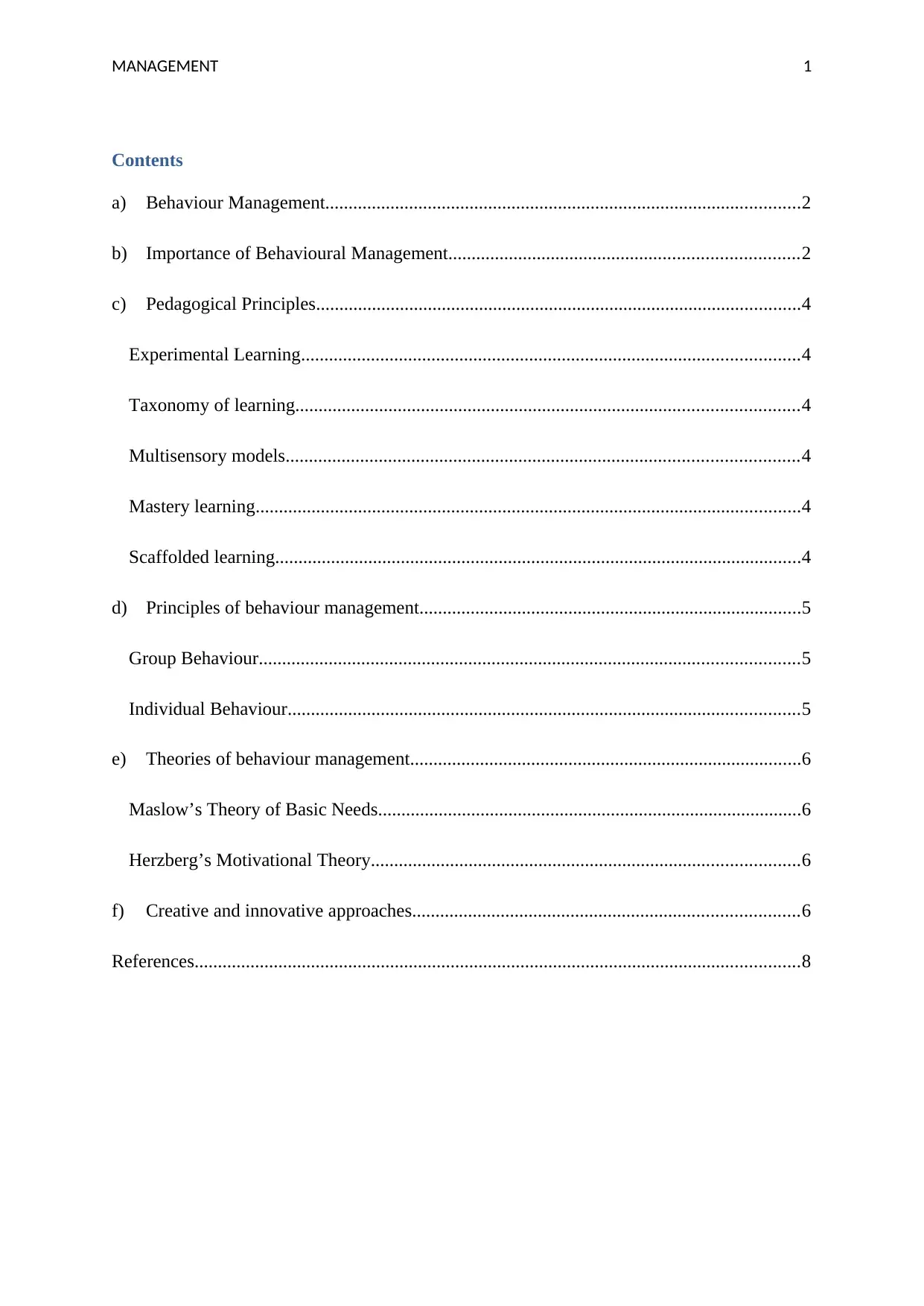
MANAGEMENT 1
Contents
a) Behaviour Management......................................................................................................2
b) Importance of Behavioural Management...........................................................................2
c) Pedagogical Principles........................................................................................................4
Experimental Learning...........................................................................................................4
Taxonomy of learning............................................................................................................4
Multisensory models..............................................................................................................4
Mastery learning.....................................................................................................................4
Scaffolded learning.................................................................................................................4
d) Principles of behaviour management..................................................................................5
Group Behaviour....................................................................................................................5
Individual Behaviour..............................................................................................................5
e) Theories of behaviour management....................................................................................6
Maslow’s Theory of Basic Needs...........................................................................................6
Herzberg’s Motivational Theory............................................................................................6
f) Creative and innovative approaches...................................................................................6
References..................................................................................................................................8
Contents
a) Behaviour Management......................................................................................................2
b) Importance of Behavioural Management...........................................................................2
c) Pedagogical Principles........................................................................................................4
Experimental Learning...........................................................................................................4
Taxonomy of learning............................................................................................................4
Multisensory models..............................................................................................................4
Mastery learning.....................................................................................................................4
Scaffolded learning.................................................................................................................4
d) Principles of behaviour management..................................................................................5
Group Behaviour....................................................................................................................5
Individual Behaviour..............................................................................................................5
e) Theories of behaviour management....................................................................................6
Maslow’s Theory of Basic Needs...........................................................................................6
Herzberg’s Motivational Theory............................................................................................6
f) Creative and innovative approaches...................................................................................6
References..................................................................................................................................8
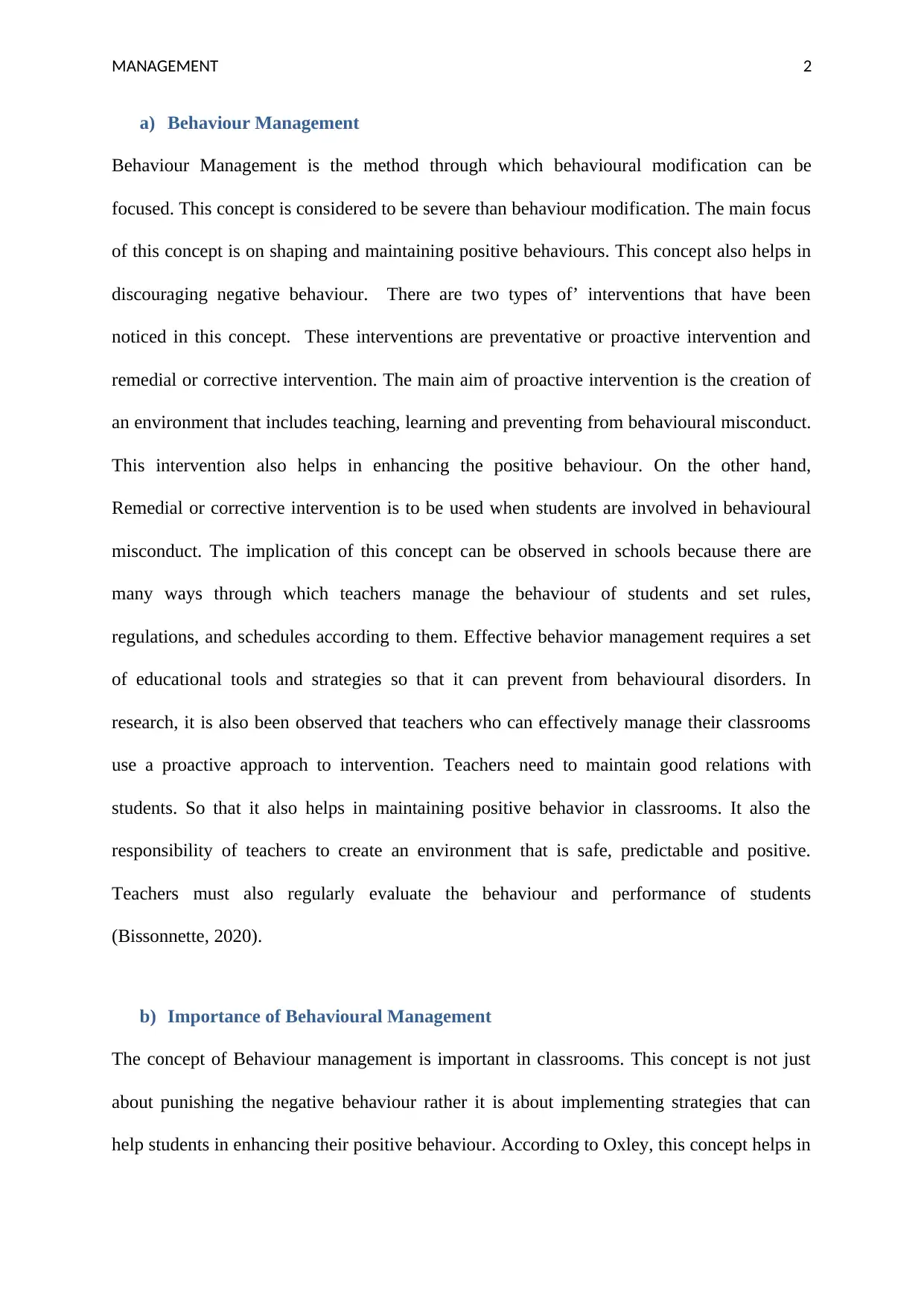
MANAGEMENT 2
a) Behaviour Management
Behaviour Management is the method through which behavioural modification can be
focused. This concept is considered to be severe than behaviour modification. The main focus
of this concept is on shaping and maintaining positive behaviours. This concept also helps in
discouraging negative behaviour. There are two types of’ interventions that have been
noticed in this concept. These interventions are preventative or proactive intervention and
remedial or corrective intervention. The main aim of proactive intervention is the creation of
an environment that includes teaching, learning and preventing from behavioural misconduct.
This intervention also helps in enhancing the positive behaviour. On the other hand,
Remedial or corrective intervention is to be used when students are involved in behavioural
misconduct. The implication of this concept can be observed in schools because there are
many ways through which teachers manage the behaviour of students and set rules,
regulations, and schedules according to them. Effective behavior management requires a set
of educational tools and strategies so that it can prevent from behavioural disorders. In
research, it is also been observed that teachers who can effectively manage their classrooms
use a proactive approach to intervention. Teachers need to maintain good relations with
students. So that it also helps in maintaining positive behavior in classrooms. It also the
responsibility of teachers to create an environment that is safe, predictable and positive.
Teachers must also regularly evaluate the behaviour and performance of students
(Bissonnette, 2020).
b) Importance of Behavioural Management
The concept of Behaviour management is important in classrooms. This concept is not just
about punishing the negative behaviour rather it is about implementing strategies that can
help students in enhancing their positive behaviour. According to Oxley, this concept helps in
a) Behaviour Management
Behaviour Management is the method through which behavioural modification can be
focused. This concept is considered to be severe than behaviour modification. The main focus
of this concept is on shaping and maintaining positive behaviours. This concept also helps in
discouraging negative behaviour. There are two types of’ interventions that have been
noticed in this concept. These interventions are preventative or proactive intervention and
remedial or corrective intervention. The main aim of proactive intervention is the creation of
an environment that includes teaching, learning and preventing from behavioural misconduct.
This intervention also helps in enhancing the positive behaviour. On the other hand,
Remedial or corrective intervention is to be used when students are involved in behavioural
misconduct. The implication of this concept can be observed in schools because there are
many ways through which teachers manage the behaviour of students and set rules,
regulations, and schedules according to them. Effective behavior management requires a set
of educational tools and strategies so that it can prevent from behavioural disorders. In
research, it is also been observed that teachers who can effectively manage their classrooms
use a proactive approach to intervention. Teachers need to maintain good relations with
students. So that it also helps in maintaining positive behavior in classrooms. It also the
responsibility of teachers to create an environment that is safe, predictable and positive.
Teachers must also regularly evaluate the behaviour and performance of students
(Bissonnette, 2020).
b) Importance of Behavioural Management
The concept of Behaviour management is important in classrooms. This concept is not just
about punishing the negative behaviour rather it is about implementing strategies that can
help students in enhancing their positive behaviour. According to Oxley, this concept helps in
⊘ This is a preview!⊘
Do you want full access?
Subscribe today to unlock all pages.

Trusted by 1+ million students worldwide
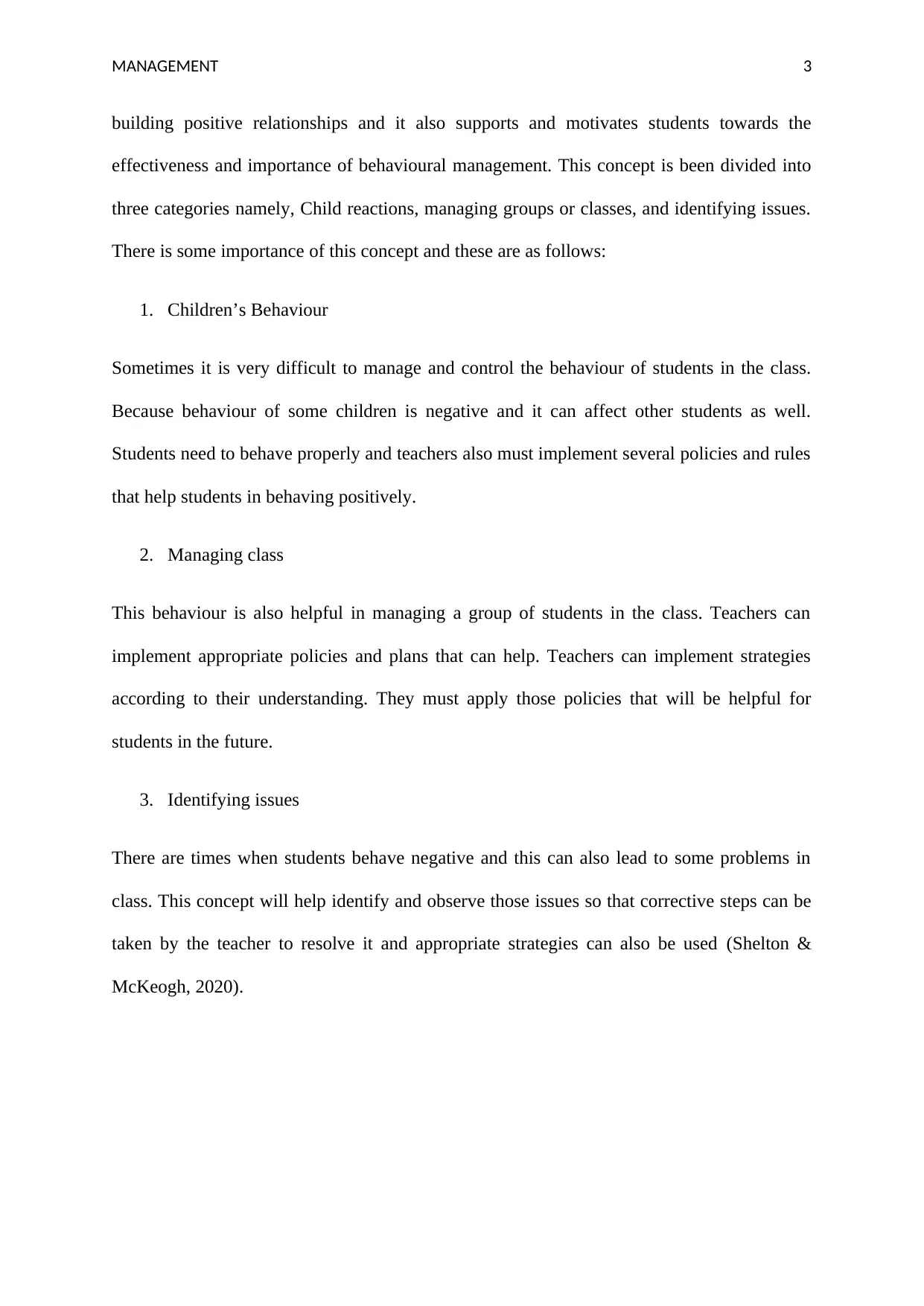
MANAGEMENT 3
building positive relationships and it also supports and motivates students towards the
effectiveness and importance of behavioural management. This concept is been divided into
three categories namely, Child reactions, managing groups or classes, and identifying issues.
There is some importance of this concept and these are as follows:
1. Children’s Behaviour
Sometimes it is very difficult to manage and control the behaviour of students in the class.
Because behaviour of some children is negative and it can affect other students as well.
Students need to behave properly and teachers also must implement several policies and rules
that help students in behaving positively.
2. Managing class
This behaviour is also helpful in managing a group of students in the class. Teachers can
implement appropriate policies and plans that can help. Teachers can implement strategies
according to their understanding. They must apply those policies that will be helpful for
students in the future.
3. Identifying issues
There are times when students behave negative and this can also lead to some problems in
class. This concept will help identify and observe those issues so that corrective steps can be
taken by the teacher to resolve it and appropriate strategies can also be used (Shelton &
McKeogh, 2020).
building positive relationships and it also supports and motivates students towards the
effectiveness and importance of behavioural management. This concept is been divided into
three categories namely, Child reactions, managing groups or classes, and identifying issues.
There is some importance of this concept and these are as follows:
1. Children’s Behaviour
Sometimes it is very difficult to manage and control the behaviour of students in the class.
Because behaviour of some children is negative and it can affect other students as well.
Students need to behave properly and teachers also must implement several policies and rules
that help students in behaving positively.
2. Managing class
This behaviour is also helpful in managing a group of students in the class. Teachers can
implement appropriate policies and plans that can help. Teachers can implement strategies
according to their understanding. They must apply those policies that will be helpful for
students in the future.
3. Identifying issues
There are times when students behave negative and this can also lead to some problems in
class. This concept will help identify and observe those issues so that corrective steps can be
taken by the teacher to resolve it and appropriate strategies can also be used (Shelton &
McKeogh, 2020).
Paraphrase This Document
Need a fresh take? Get an instant paraphrase of this document with our AI Paraphraser
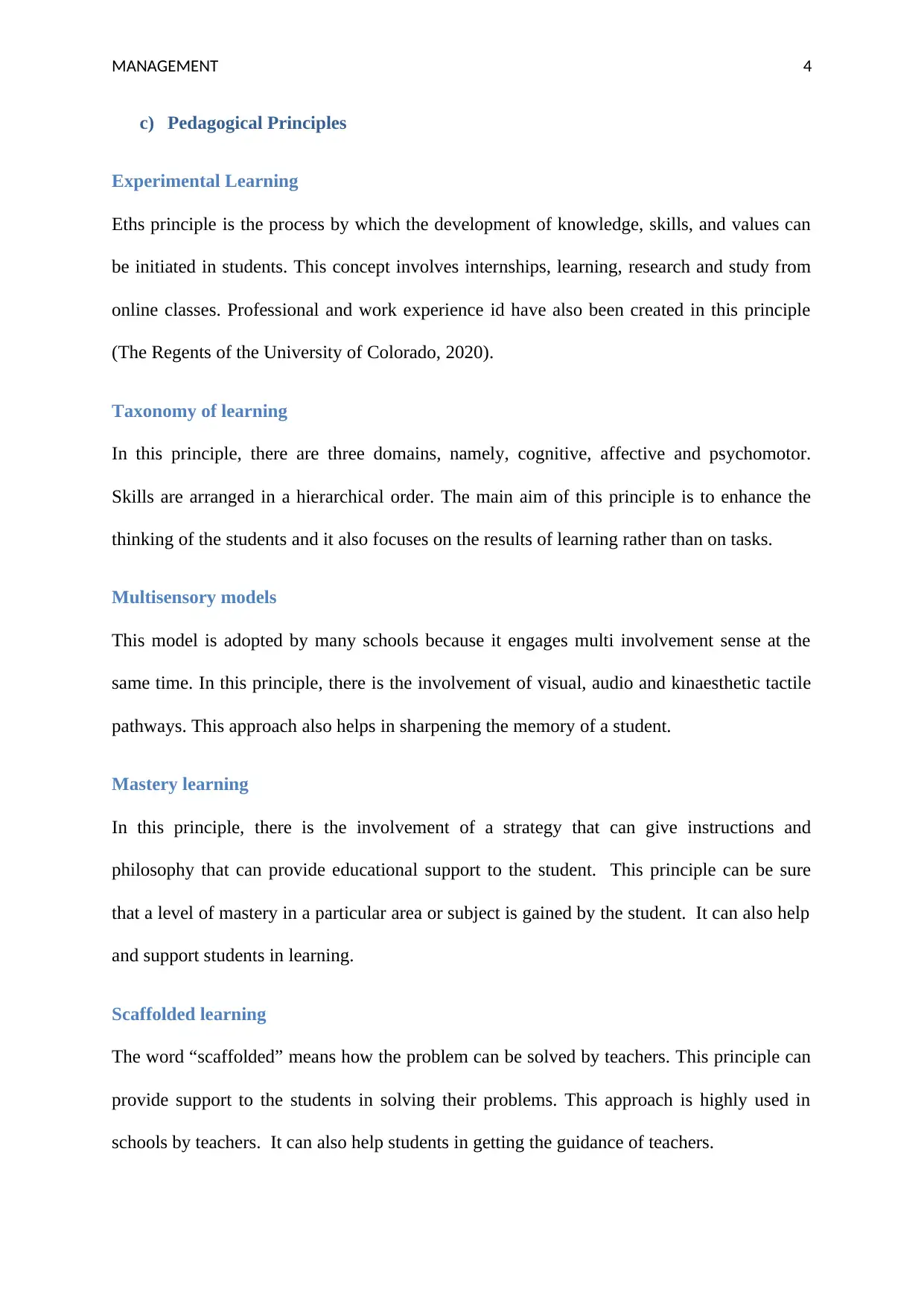
MANAGEMENT 4
c) Pedagogical Principles
Experimental Learning
Eths principle is the process by which the development of knowledge, skills, and values can
be initiated in students. This concept involves internships, learning, research and study from
online classes. Professional and work experience id have also been created in this principle
(The Regents of the University of Colorado, 2020).
Taxonomy of learning
In this principle, there are three domains, namely, cognitive, affective and psychomotor.
Skills are arranged in a hierarchical order. The main aim of this principle is to enhance the
thinking of the students and it also focuses on the results of learning rather than on tasks.
Multisensory models
This model is adopted by many schools because it engages multi involvement sense at the
same time. In this principle, there is the involvement of visual, audio and kinaesthetic tactile
pathways. This approach also helps in sharpening the memory of a student.
Mastery learning
In this principle, there is the involvement of a strategy that can give instructions and
philosophy that can provide educational support to the student. This principle can be sure
that a level of mastery in a particular area or subject is gained by the student. It can also help
and support students in learning.
Scaffolded learning
The word “scaffolded” means how the problem can be solved by teachers. This principle can
provide support to the students in solving their problems. This approach is highly used in
schools by teachers. It can also help students in getting the guidance of teachers.
c) Pedagogical Principles
Experimental Learning
Eths principle is the process by which the development of knowledge, skills, and values can
be initiated in students. This concept involves internships, learning, research and study from
online classes. Professional and work experience id have also been created in this principle
(The Regents of the University of Colorado, 2020).
Taxonomy of learning
In this principle, there are three domains, namely, cognitive, affective and psychomotor.
Skills are arranged in a hierarchical order. The main aim of this principle is to enhance the
thinking of the students and it also focuses on the results of learning rather than on tasks.
Multisensory models
This model is adopted by many schools because it engages multi involvement sense at the
same time. In this principle, there is the involvement of visual, audio and kinaesthetic tactile
pathways. This approach also helps in sharpening the memory of a student.
Mastery learning
In this principle, there is the involvement of a strategy that can give instructions and
philosophy that can provide educational support to the student. This principle can be sure
that a level of mastery in a particular area or subject is gained by the student. It can also help
and support students in learning.
Scaffolded learning
The word “scaffolded” means how the problem can be solved by teachers. This principle can
provide support to the students in solving their problems. This approach is highly used in
schools by teachers. It can also help students in getting the guidance of teachers.
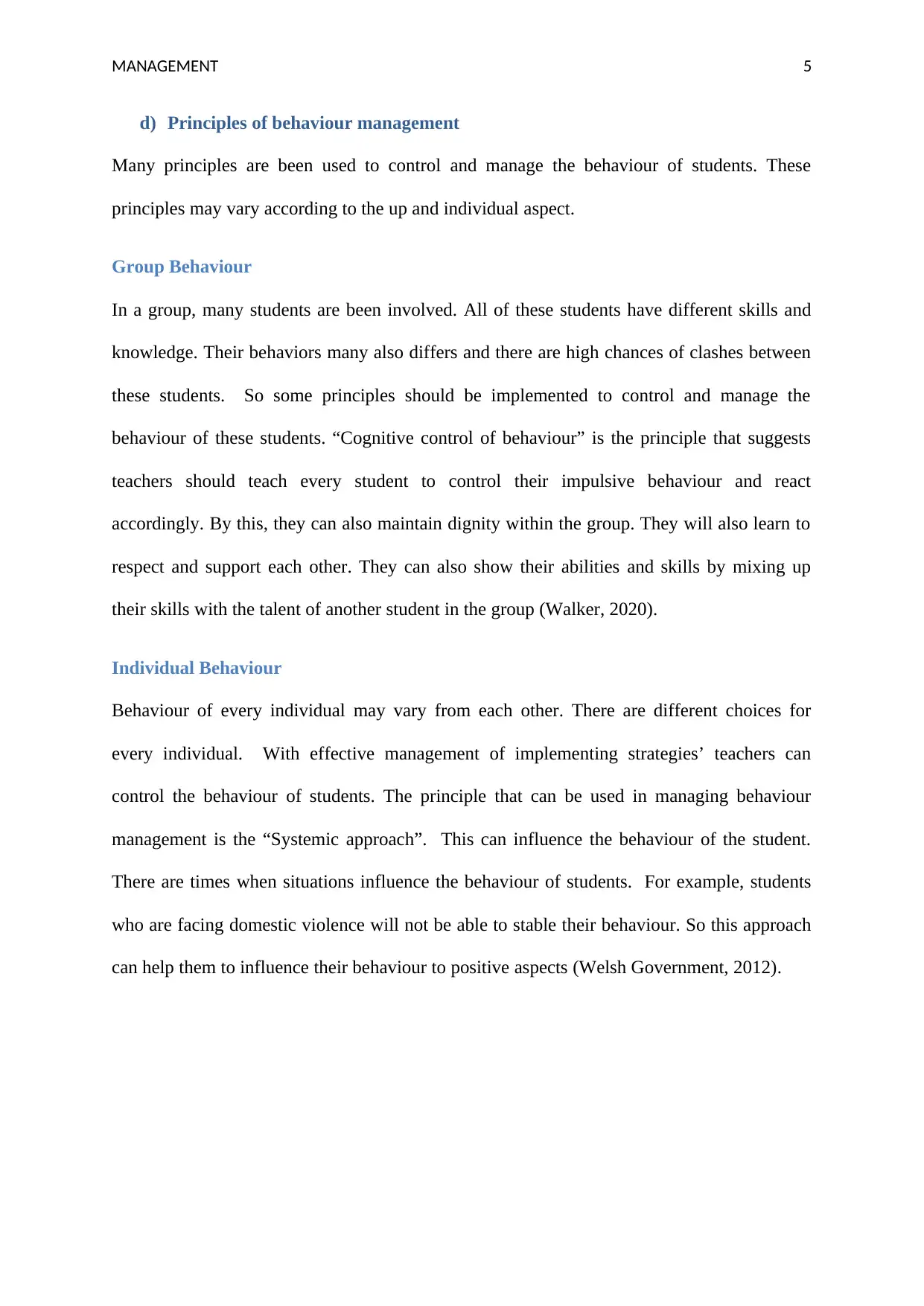
MANAGEMENT 5
d) Principles of behaviour management
Many principles are been used to control and manage the behaviour of students. These
principles may vary according to the up and individual aspect.
Group Behaviour
In a group, many students are been involved. All of these students have different skills and
knowledge. Their behaviors many also differs and there are high chances of clashes between
these students. So some principles should be implemented to control and manage the
behaviour of these students. “Cognitive control of behaviour” is the principle that suggests
teachers should teach every student to control their impulsive behaviour and react
accordingly. By this, they can also maintain dignity within the group. They will also learn to
respect and support each other. They can also show their abilities and skills by mixing up
their skills with the talent of another student in the group (Walker, 2020).
Individual Behaviour
Behaviour of every individual may vary from each other. There are different choices for
every individual. With effective management of implementing strategies’ teachers can
control the behaviour of students. The principle that can be used in managing behaviour
management is the “Systemic approach”. This can influence the behaviour of the student.
There are times when situations influence the behaviour of students. For example, students
who are facing domestic violence will not be able to stable their behaviour. So this approach
can help them to influence their behaviour to positive aspects (Welsh Government, 2012).
d) Principles of behaviour management
Many principles are been used to control and manage the behaviour of students. These
principles may vary according to the up and individual aspect.
Group Behaviour
In a group, many students are been involved. All of these students have different skills and
knowledge. Their behaviors many also differs and there are high chances of clashes between
these students. So some principles should be implemented to control and manage the
behaviour of these students. “Cognitive control of behaviour” is the principle that suggests
teachers should teach every student to control their impulsive behaviour and react
accordingly. By this, they can also maintain dignity within the group. They will also learn to
respect and support each other. They can also show their abilities and skills by mixing up
their skills with the talent of another student in the group (Walker, 2020).
Individual Behaviour
Behaviour of every individual may vary from each other. There are different choices for
every individual. With effective management of implementing strategies’ teachers can
control the behaviour of students. The principle that can be used in managing behaviour
management is the “Systemic approach”. This can influence the behaviour of the student.
There are times when situations influence the behaviour of students. For example, students
who are facing domestic violence will not be able to stable their behaviour. So this approach
can help them to influence their behaviour to positive aspects (Welsh Government, 2012).
⊘ This is a preview!⊘
Do you want full access?
Subscribe today to unlock all pages.

Trusted by 1+ million students worldwide
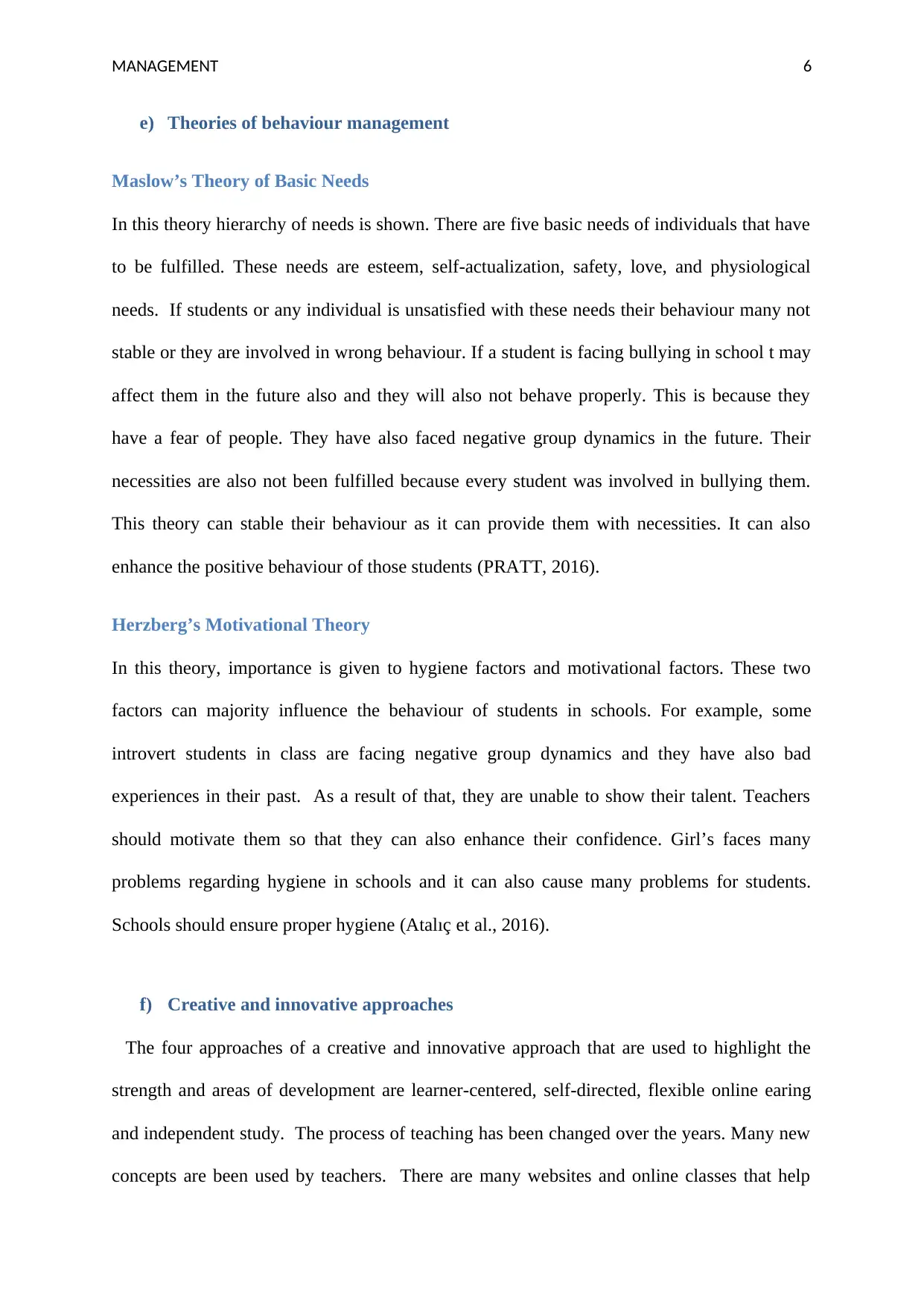
MANAGEMENT 6
e) Theories of behaviour management
Maslow’s Theory of Basic Needs
In this theory hierarchy of needs is shown. There are five basic needs of individuals that have
to be fulfilled. These needs are esteem, self-actualization, safety, love, and physiological
needs. If students or any individual is unsatisfied with these needs their behaviour many not
stable or they are involved in wrong behaviour. If a student is facing bullying in school t may
affect them in the future also and they will also not behave properly. This is because they
have a fear of people. They have also faced negative group dynamics in the future. Their
necessities are also not been fulfilled because every student was involved in bullying them.
This theory can stable their behaviour as it can provide them with necessities. It can also
enhance the positive behaviour of those students (PRATT, 2016).
Herzberg’s Motivational Theory
In this theory, importance is given to hygiene factors and motivational factors. These two
factors can majority influence the behaviour of students in schools. For example, some
introvert students in class are facing negative group dynamics and they have also bad
experiences in their past. As a result of that, they are unable to show their talent. Teachers
should motivate them so that they can also enhance their confidence. Girl’s faces many
problems regarding hygiene in schools and it can also cause many problems for students.
Schools should ensure proper hygiene (Atalıç et al., 2016).
f) Creative and innovative approaches
The four approaches of a creative and innovative approach that are used to highlight the
strength and areas of development are learner-centered, self-directed, flexible online earing
and independent study. The process of teaching has been changed over the years. Many new
concepts are been used by teachers. There are many websites and online classes that help
e) Theories of behaviour management
Maslow’s Theory of Basic Needs
In this theory hierarchy of needs is shown. There are five basic needs of individuals that have
to be fulfilled. These needs are esteem, self-actualization, safety, love, and physiological
needs. If students or any individual is unsatisfied with these needs their behaviour many not
stable or they are involved in wrong behaviour. If a student is facing bullying in school t may
affect them in the future also and they will also not behave properly. This is because they
have a fear of people. They have also faced negative group dynamics in the future. Their
necessities are also not been fulfilled because every student was involved in bullying them.
This theory can stable their behaviour as it can provide them with necessities. It can also
enhance the positive behaviour of those students (PRATT, 2016).
Herzberg’s Motivational Theory
In this theory, importance is given to hygiene factors and motivational factors. These two
factors can majority influence the behaviour of students in schools. For example, some
introvert students in class are facing negative group dynamics and they have also bad
experiences in their past. As a result of that, they are unable to show their talent. Teachers
should motivate them so that they can also enhance their confidence. Girl’s faces many
problems regarding hygiene in schools and it can also cause many problems for students.
Schools should ensure proper hygiene (Atalıç et al., 2016).
f) Creative and innovative approaches
The four approaches of a creative and innovative approach that are used to highlight the
strength and areas of development are learner-centered, self-directed, flexible online earing
and independent study. The process of teaching has been changed over the years. Many new
concepts are been used by teachers. There are many websites and online classes that help
Paraphrase This Document
Need a fresh take? Get an instant paraphrase of this document with our AI Paraphraser
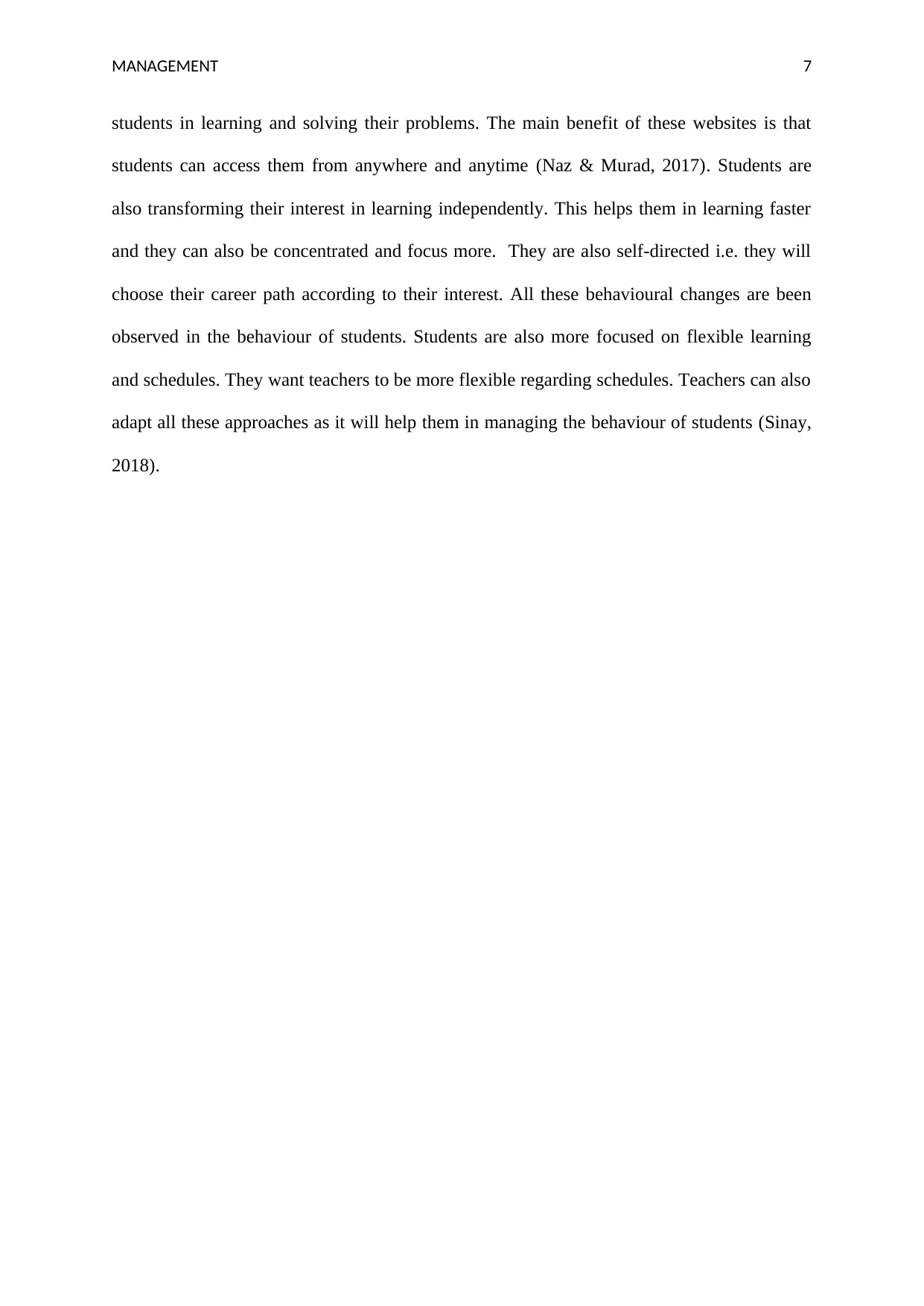
MANAGEMENT 7
students in learning and solving their problems. The main benefit of these websites is that
students can access them from anywhere and anytime (Naz & Murad, 2017). Students are
also transforming their interest in learning independently. This helps them in learning faster
and they can also be concentrated and focus more. They are also self-directed i.e. they will
choose their career path according to their interest. All these behavioural changes are been
observed in the behaviour of students. Students are also more focused on flexible learning
and schedules. They want teachers to be more flexible regarding schedules. Teachers can also
adapt all these approaches as it will help them in managing the behaviour of students (Sinay,
2018).
students in learning and solving their problems. The main benefit of these websites is that
students can access them from anywhere and anytime (Naz & Murad, 2017). Students are
also transforming their interest in learning independently. This helps them in learning faster
and they can also be concentrated and focus more. They are also self-directed i.e. they will
choose their career path according to their interest. All these behavioural changes are been
observed in the behaviour of students. Students are also more focused on flexible learning
and schedules. They want teachers to be more flexible regarding schedules. Teachers can also
adapt all these approaches as it will help them in managing the behaviour of students (Sinay,
2018).
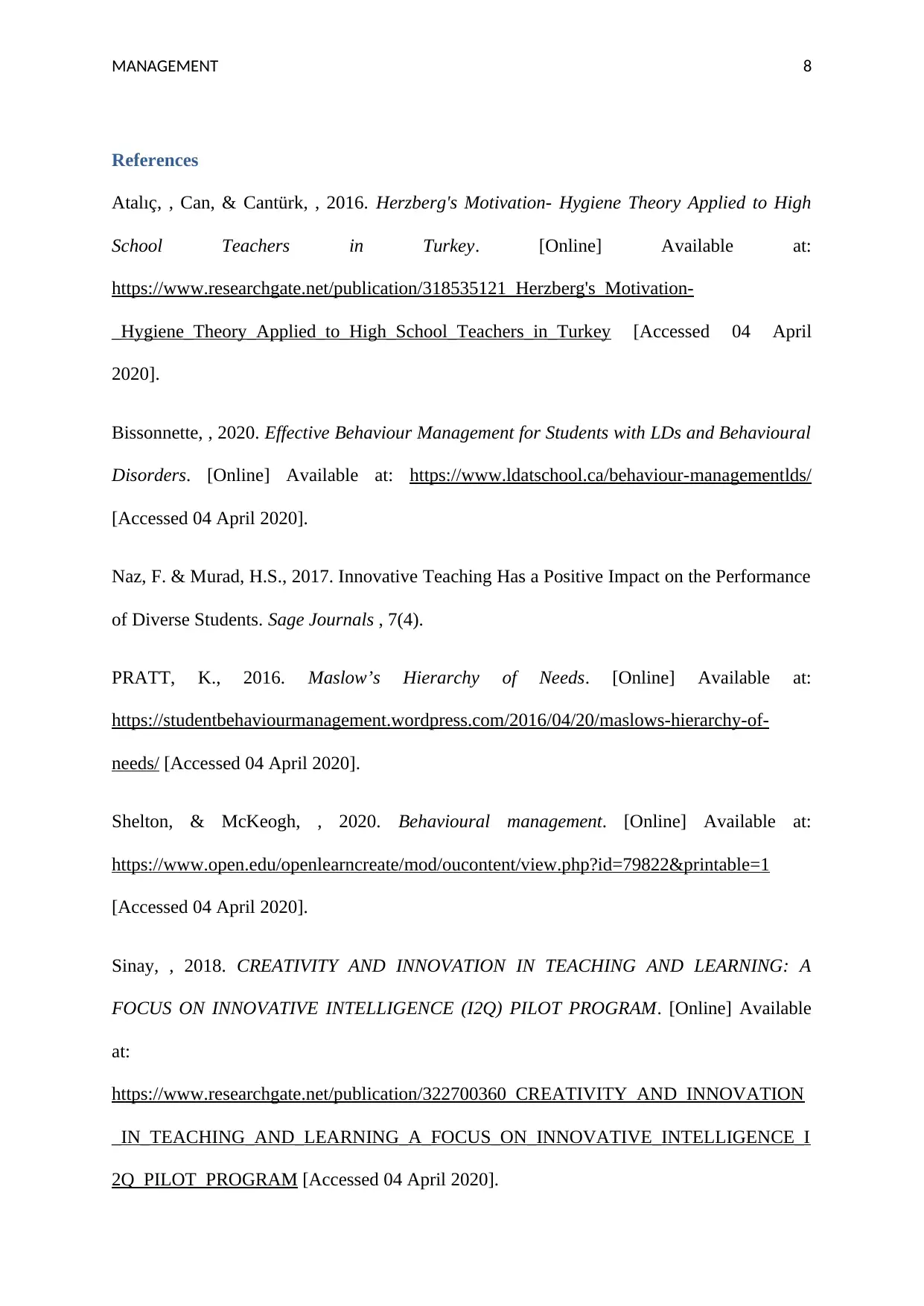
MANAGEMENT 8
References
Atalıç, , Can, & Cantürk, , 2016. Herzberg's Motivation- Hygiene Theory Applied to High
School Teachers in Turkey. [Online] Available at:
https://www.researchgate.net/publication/318535121_Herzberg's_Motivation-
_Hygiene_Theory_Applied_to_High_School_Teachers_in_Turkey [Accessed 04 April
2020].
Bissonnette, , 2020. Effective Behaviour Management for Students with LDs and Behavioural
Disorders. [Online] Available at: https://www.ldatschool.ca/behaviour-managementlds/
[Accessed 04 April 2020].
Naz, F. & Murad, H.S., 2017. Innovative Teaching Has a Positive Impact on the Performance
of Diverse Students. Sage Journals , 7(4).
PRATT, K., 2016. Maslow’s Hierarchy of Needs. [Online] Available at:
https://studentbehaviourmanagement.wordpress.com/2016/04/20/maslows-hierarchy-of-
needs/ [Accessed 04 April 2020].
Shelton, & McKeogh, , 2020. Behavioural management. [Online] Available at:
https://www.open.edu/openlearncreate/mod/oucontent/view.php?id=79822&printable=1
[Accessed 04 April 2020].
Sinay, , 2018. CREATIVITY AND INNOVATION IN TEACHING AND LEARNING: A
FOCUS ON INNOVATIVE INTELLIGENCE (I2Q) PILOT PROGRAM. [Online] Available
at:
https://www.researchgate.net/publication/322700360_CREATIVITY_AND_INNOVATION
_IN_TEACHING_AND_LEARNING_A_FOCUS_ON_INNOVATIVE_INTELLIGENCE_I
2Q_PILOT_PROGRAM [Accessed 04 April 2020].
References
Atalıç, , Can, & Cantürk, , 2016. Herzberg's Motivation- Hygiene Theory Applied to High
School Teachers in Turkey. [Online] Available at:
https://www.researchgate.net/publication/318535121_Herzberg's_Motivation-
_Hygiene_Theory_Applied_to_High_School_Teachers_in_Turkey [Accessed 04 April
2020].
Bissonnette, , 2020. Effective Behaviour Management for Students with LDs and Behavioural
Disorders. [Online] Available at: https://www.ldatschool.ca/behaviour-managementlds/
[Accessed 04 April 2020].
Naz, F. & Murad, H.S., 2017. Innovative Teaching Has a Positive Impact on the Performance
of Diverse Students. Sage Journals , 7(4).
PRATT, K., 2016. Maslow’s Hierarchy of Needs. [Online] Available at:
https://studentbehaviourmanagement.wordpress.com/2016/04/20/maslows-hierarchy-of-
needs/ [Accessed 04 April 2020].
Shelton, & McKeogh, , 2020. Behavioural management. [Online] Available at:
https://www.open.edu/openlearncreate/mod/oucontent/view.php?id=79822&printable=1
[Accessed 04 April 2020].
Sinay, , 2018. CREATIVITY AND INNOVATION IN TEACHING AND LEARNING: A
FOCUS ON INNOVATIVE INTELLIGENCE (I2Q) PILOT PROGRAM. [Online] Available
at:
https://www.researchgate.net/publication/322700360_CREATIVITY_AND_INNOVATION
_IN_TEACHING_AND_LEARNING_A_FOCUS_ON_INNOVATIVE_INTELLIGENCE_I
2Q_PILOT_PROGRAM [Accessed 04 April 2020].
⊘ This is a preview!⊘
Do you want full access?
Subscribe today to unlock all pages.

Trusted by 1+ million students worldwide
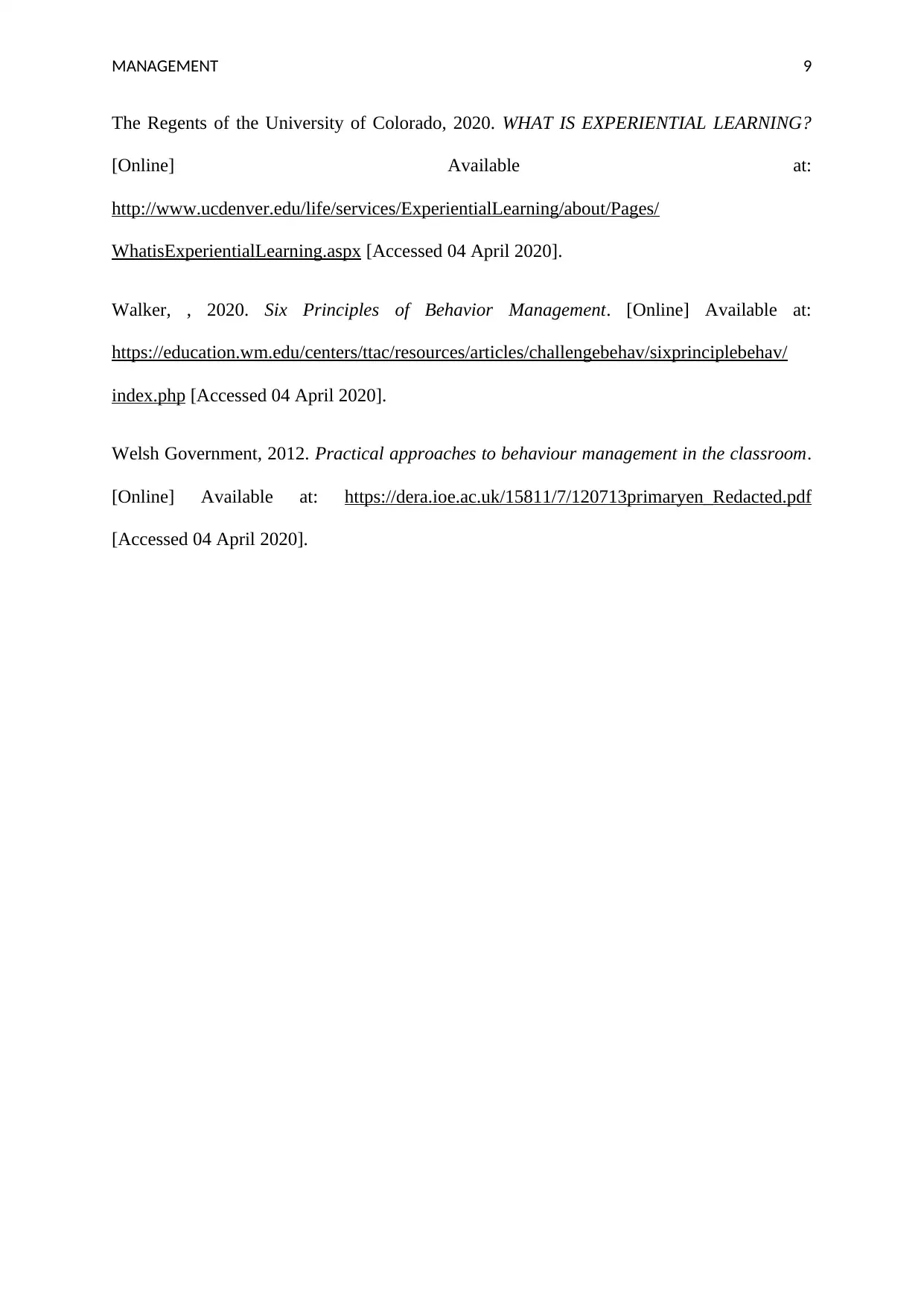
MANAGEMENT 9
The Regents of the University of Colorado, 2020. WHAT IS EXPERIENTIAL LEARNING?
[Online] Available at:
http://www.ucdenver.edu/life/services/ExperientialLearning/about/Pages/
WhatisExperientialLearning.aspx [Accessed 04 April 2020].
Walker, , 2020. Six Principles of Behavior Management. [Online] Available at:
https://education.wm.edu/centers/ttac/resources/articles/challengebehav/sixprinciplebehav/
index.php [Accessed 04 April 2020].
Welsh Government, 2012. Practical approaches to behaviour management in the classroom.
[Online] Available at: https://dera.ioe.ac.uk/15811/7/120713primaryen_Redacted.pdf
[Accessed 04 April 2020].
The Regents of the University of Colorado, 2020. WHAT IS EXPERIENTIAL LEARNING?
[Online] Available at:
http://www.ucdenver.edu/life/services/ExperientialLearning/about/Pages/
WhatisExperientialLearning.aspx [Accessed 04 April 2020].
Walker, , 2020. Six Principles of Behavior Management. [Online] Available at:
https://education.wm.edu/centers/ttac/resources/articles/challengebehav/sixprinciplebehav/
index.php [Accessed 04 April 2020].
Welsh Government, 2012. Practical approaches to behaviour management in the classroom.
[Online] Available at: https://dera.ioe.ac.uk/15811/7/120713primaryen_Redacted.pdf
[Accessed 04 April 2020].
1 out of 10
Related Documents
Your All-in-One AI-Powered Toolkit for Academic Success.
+13062052269
info@desklib.com
Available 24*7 on WhatsApp / Email
![[object Object]](/_next/static/media/star-bottom.7253800d.svg)
Unlock your academic potential
Copyright © 2020–2026 A2Z Services. All Rights Reserved. Developed and managed by ZUCOL.





